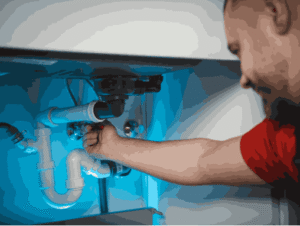Hard water is a common but often overlooked issue in many households. It contains high levels of minerals like calcium and magnesium, which gradually accumulate inside pipes, appliances, and fixtures. While it may not pose health risks, it can create severe plumbing problems, such as clogs, reduced water pressure, and increased wear on household systems.
Reliable plumbing professionals, much like Bluefrog Plumbing, stress the importance of addressing hard water issues before they cause costly damage. Recognizing early warning signs can help homeowners prevent expensive repairs and maintain an efficient plumbing system.
1. Low Water Pressure
If multiple faucets and showers in the home seem to have weak water flow, hard water could be the cause. Over time, mineral deposits settle inside pipes, narrowing the passage for water to flow freely. Unlike a clogged fixture, this issue affects the entire plumbing system and worsens if not treated promptly.
The buildup can eventually lead to severe blockages, requiring professional descaling or pipe replacement. Regular maintenance and treatment options help optimize water pressure and prevent expensive plumbing repairs.
2. Stubborn White or Rust-Colored Stains on Fixtures
Hard water leaves behind a mineral residue that appears as white, chalky streaks, or rust-colored stains on sinks, tubs, and toilets. No matter how often they are scrubbed, they tend to return, making cleaning an endless struggle. These deposits look bad and also contribute to the gradual deterioration of fixtures.
Over time, mineral buildup can cause faucets and showerheads to corrode and malfunction. Addressing the root cause rather than repeatedly cleaning the stains is the best way to maintain the longevity of plumbing fixtures.
3. Frequent Appliance Breakdowns and Inefficiencies
Appliances that use water—such as dishwashers, water heaters, and washing machines—are highly susceptible to hard water damage. Mineral deposits form inside these appliances, reducing their efficiency and forcing them to use more energy. If an appliance frequently malfunctions, takes longer to operate, or doesn’t perform as well as before, mineral buildup could be the culprit.
The added strain on appliances shortens their lifespan and increases energy costs. Regular maintenance and water treatment systems can prevent unnecessary breakdowns and extend the life of costly home equipment.
4. Professional Plumbing Solutions for Hard Water Issues
Managing hard water problems requires more than routine cleaning. To prevent mineral buildup, professional plumbers offer long-term solutions, such as water softeners, filtration systems, and pipe treatments. These experts assess the severity of the problem and recommend the best approach to protecting a home’s plumbing system.
By investing in preventative plumbing services, homeowners can extend the life of their pipes, fixtures, and appliances. Addressing hard water concerns early reduces the risk of recurring repairs and ensures a reliable water system.
.
5. Persistent Leaks and Recurring Plumbing Repairs
Hard water may be to blame if a home’s plumbing system requires constant repairs. Over time, mineral deposits weaken pipes, making them more prone to leaks and cracks. Ignoring these issues can result in water damage, mold growth, and increased repair costs. Plumbing professionals can diagnose the extent of mineral buildup and recommend the right solutions to prevent ongoing damage. Regular inspections and water treatment methods can help homeowners avoid expensive, repetitive plumbing repairs.
Plumbing specialists, such as those at Bluefrog Plumbing, emphasize the importance of tackling hard water issues before they lead to significant damage. Low water pressure, stubborn stains, appliance inefficiencies, and frequent plumbing repairs are all warning signs that shouldn’t be ignored. Taking proactive steps to improve water quality helps homeowners avoid costly repairs, extend appliance life, and maintain a reliable plumbing system.







